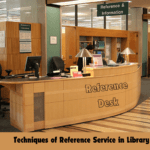Library cooperation is a comprehensive concept; it can range from the international level to the lowest level. The inclination of library patrons to read books is not exclusive to educational institutions in the contemporary period. New approaches to library services have opened readers’ and users’ eyes to both the known and unknown world of books and information, just as books and readers influence library services. So readers and users themselves have become morally responsible to collect books and information from any library for their needs.
Library cooperation is the practice of multiple libraries in the same category working together in a logical manner to appropriately address the reader’s evolving demands on a daily basis.

Web-based library cooperation
Web-based library cooperation involves libraries collaborating and coordinating using online platforms and technologies to share resources, services, and expertise. This cooperation can take various forms, including:
1. Resource Sharing: Libraries can work together to share their collections, allowing patrons to access materials beyond what their local library offers. This can include interlibrary loan services, digital repositories, and shared cataloging efforts.
2. Digital Libraries: Libraries can combine resources to create digital libraries that provide access to digitized collections, archives, and special collections. These digital libraries can be made accessible to patrons’ worldwide, promoting broader access to cultural and scholarly materials.
3. Collaborative Cataloging: Libraries can collaborate to create and maintain shared cataloging records, ensuring consistent and standardized access to bibliographic information across multiple institutions. This reduces duplication of effort and improves the quality of metadata.
4. Joint Programs and Services: Libraries can work together on programs and services, such as joint educational initiatives, research support services, or outreach programs. By sharing expertise and resources, libraries can provide more comprehensive and efficient services to their communities.
5. Training and Professional Development: Libraries can collaborate on training programs and professional development opportunities for library staff, using online platforms to facilitate remote learning and collaboration.
6. Open Access Initiatives: Libraries can join forces to promote open access to scholarly research by supporting open access publishing models, hosting institutional repositories, and advocating for policies that promote the free exchange of knowledge.
In summary, web-based library cooperation allows libraries to use technology to expand their reach, improve efficiency, and better serve their communities.

Library cooperation system in the world:
The global library cooperation system encourages collaboration among libraries worldwide to improve access to information and resources. Initiatives such as interlibrary loan programs allow libraries to share books, journals, and other materials, expanding their collections beyond physical boundaries. Digital consortia and networks, like OCLC (Online Computer Library Center), facilitate the sharing of cataloging data and digital resources, making information more accessible to users around the world. International organizations like IFLA (International Federation of Library Associations and Institutions) promote standards, policies, and best practices for library services. Cooperative cataloging projects enable libraries to collaboratively create and maintain bibliographic records, enhancing the quality and consistency of library catalogs. Shared digital repositories, such as HathiTrust and Europeana, provide access to digitized content from multiple institutions, preserving and making cultural heritage accessible to all. Professional development and exchange programs allow librarians to share knowledge, skills, and experiences across borders. Collaborative research and development initiatives drive innovation in library services and technologies. Open-access movements and agreements among libraries and publishers help reduce barriers to scholarly communication. Through this collaboration, libraries worldwide can better serve their communities, promote literacy, and support global education and research. There are some platforms for library cooperation given below:
- OCLC (Online Computer Library Center): OCLC is a global library cooperative that provides shared technology services, original research, and community programs to libraries worldwide. It offers services such as WorldCat, which is a global catalog of library collections.
- HathiTrust: HathiTrust is a partnership of academic and research institutions that collaboratively preserve and provide access to a vast collection of digitized materials, including books, journals, and other scholarly content.
- COPPUL (Council of Prairie and Pacific University Libraries): COPPUL is a consortium of 22 university libraries in Western Canada that collaborates on resource sharing, collective purchasing, and other initiatives to enhance library services.
- PALCI (Pennsylvania Academic Library Consortium, Inc.): PALCI is a consortium of academic and research libraries in Pennsylvania and neighboring states that collaborates on resource sharing, licensing of electronic resources, and other cooperative activities.
- CARL (Canadian Association of Research Libraries): CARL is an association of Canada’s largest academic research libraries that collaborates on initiatives related to scholarly communication, digital preservation, and research support services.
- ASERL (Association of Southeastern Research Libraries): ASERL is a consortium of research libraries in the southeastern United States that collaborates on resource sharing, digitization initiatives, and advocacy efforts.
- CRL (Center for Research Libraries): CRL is an international consortium of university, college, and independent research libraries that acquires and preserves unique primary source materials for scholarly research.
- LYRASIS: LYRASIS is a nonprofit membership organization that provides technology and content services, professional development, and strategic support to libraries, archives, and museums worldwide.
- SCELC (Statewide California Electronic Library Consortium): SCELC is a consortium of academic and research libraries in California that collaborates on licensing of electronic resources, digitization projects, and other cooperative initiatives.
- COAR (Confederation of Open Access Repositories): COAR is an international association of repositories and related organizations that promotes the development of open access repositories and supports interoperability and collaboration among them.
These are just a few examples of library cooperation systems that are making significant contributions to the advancement of libraries and the sharing of resources and expertise on a global scale.



